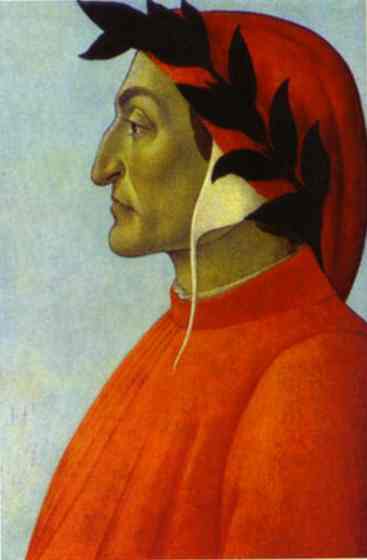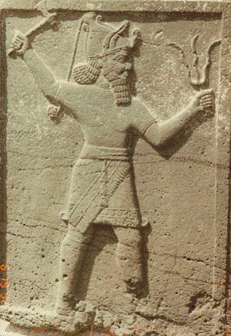
The first Canto of Dante's Inferno is essential for an understanding not only of the Inferno itself, but also of the whole trilogy of the Comedia. I shall try to outline some relavent points.
All English translations are by Laurence Binyon (the BEST translation of the Commedia) I skip some stanzas in my analysis.
Nel mezzo del cammin di nostra vita
mi ritrovai per una selva oscura
che la diritta via era smarrita
(Midway the journey of life I was 'ware
That I had strayed into a dark forest
And the right path appeared not anywhere)
I believe the first stanza can be interpreted in light of Plato's Cave allegory. One needs light in order to be guided correctly intellectually; those who have not escaped from the cave and have not seen the brilliance of the Sun cannot claim to have true knowledge (and thus be correctly guided). Thus, since Dante is in a dark forest the right path neccesarily cannot appear; there is no light to guide him. Now, Dante is also invoking Christian imagery (the Light as the light of God/the Word, etc). Given the blatent Platonic allusions, one could argue that the moral is a function of the intellectual. That is, one needs the intellectual vision provided by the light in order to be correctly
morally guided.
Tied in with this is the Platonic (and Greek in general) concept of truth. Truth, I believe, meant something very different for the Greeks than it does for us. The Greek word is aletheia. This can be deconstructed eymologically as follows: lethe is literally translated as concealment, and the 'a' is the alpha-privative signifying negation (like the English un-). Thus, the word we usually translate as truth literally means unconcealment. The way must be true (that is unconcealed) for Dante given he is in a dark forest; this is only possible with light.
Io non so ben ridir com' io v'entrai
tant' era pieno di sonno a quel punto
che la verace vai abbandonai
(I cannot well remember in my mind
How I came thither, so was I immersed
In sleep, when the true way I left behind)
Dante states he was "in sleep". That is, he was in darkness; the true way was not revealed to him. The true way he left behind is, of course, the way to God/salvation. He has thus embarked on the path of error; the path that does not lead to God.
Ma poi ch' i' fue al pie d' un colle guinto,
la dove terminava quella valle
che m' avea di paura il cor compunto,
guardai in alto, e vidi le sue spalle
vestite gia de' raggi del pianeta
che mema dritto altrui per ogni calle.
(But when my footsteps had attained the first
Slope of a hill, at the end of that drear vale
Which with such terror had my spirit pierced,
I looked up, and beheld its shoulders pale
Already in clothing of that planet's light
Which guideth men on all roads without fail.)
Dante now arrives at the foot of a hill that is bathed in light. The imagery here should be obvious; the hill is the hill of Wisdom/Truth. In terms of Christian symbolism, it is the Hill of God which one must ascend in order to gain salvation. The Platonic interpretation sheds some light on this as well. The hill has been "unconcealed"; it shines forth from the dark forest that Dante has been plodding through.
Ed ecco, quasi al cominciar dell' erta
una lonza leggiera e presta molto,
che di pel maculato era coverta;
e non mi si partia d' innanzi al volto.
anzi impediva tanto il mio cammino,
ch' i' fui per ritornar piu volte volto.
(And at the ascent, as 't were on the first stair
Behold! A Loepard light and swift of limb
And covered with a hide of spotted hair.
And he would not depart, but still would trim
His pace in front of me, so that many a time
I turned me to go back, because of him)
The poet now makes an attempt at climbing up the hill, but encounters a leopard which impedes his way. However,
mosse di prima quelle cose belle;
si ch' a bene sperar m' era cagione
di quella fera alla geatta pelle
(When divine Love first motioned and enskied
Those beauteous things; so that a hope I caught
To evade that creature with the freckled hide)
Dante is able to evade the leopard; the "sun mounted up" and allowed him to do this. Once again, the Platonic/Christian imagery applies here.
l'ora del tempo e la dolce stagione;
ma non si che paura non mi desse
la vista che m' apparve d' un leone.
(The hour of time and the sweet season wrought
Thus on me; yet not so much, but when appeared
A Lion, terror to my heart he brought)
He now encounters a lion; I shall work out the imagery in due course.
Ed una lupa, che di tutte brame
sembiava carca nella sua margrezza,
e molte genti fe gia viver grame,
(And a she-Wolf, that in her famished fell
Looked all infuriate craving; she hath meant
To many ere now that they in misery dwell)
Along with th

e lion Dante comes upon a she-Wolf. What do these three animals (the Leopard, the Lion and the she-Wolf) all symbolize? The answer, I believe, can be found in the 1st Epistle of St. John. He states that the three things that impede one's way to beatitude are temptations of the flesh, pride in position of power, and cupiditas (ie. lust for more). The Leopard, being a beautiful, swift creature, symbolizes material pleasure, the Lion is pride in position of power, and the she-Wolf cupiditas. The she-Wolf imagery is the most striking; she has a "famished fell" and looks "all infuiate craving". This also plays into the imagery of sin "hollowing one out"; the she-Wolf is so famished that there is almost nothing left of her.
tal mi fece la bestia sanza pace,
che, venondomi incontro, a poco a poco
mi ripignova la dove 'l sol tace
(To such state brought me, in dread of his attack,
That restless beast, who by degress perforce
To where the Sun is silent drove me back)
[Binyon mistranslates "his" in the first line; it is la bestia and thus is feminine]
The she-Wolf (cupiditas) overpowers Dante and he is driven back to the dark forest of error. That is, Dante loses his way again on account of falling into the trap of "lust for more"; he can no longer reach the hill of Wisdom/Truth, having encountered cupiditas.
Dante, having attempted to ascend the hill on his own finds he cannot; he keeps encountering sin and is thus driven back into the wrong path. He needs help: Virgil's help. I will perhaps write another post on the encounter with Virgil.
In terms of the structure of the Comedia as a whole, the first Canto introduces the main theme: moving toward the "correct path". Dante cannot do this on his own; he must first take a journey. First, he travels through Hell. This is in order to develop a revulsion to sin. At the beginning of his journey, Dante feels great pity for those in Hell, but by the end he realizes that those in Hell should be in Hell and feels no more pity for them. After coming to this realization he travels through Purgatory which "cleanses" Dante (cf. the Fountain episode). Finally, after becoming cleansed and having no pity for sinners, Dante can begin his journey "up the hill" to salvation and the beautitude of God.













